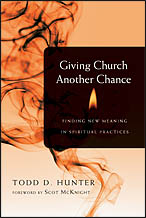Todd Hunter’s Giving Church Another Chance, reviewed by James Williams
 Todd D. Hunter, Giving Church Another Chance: Finding New Meaning in Spiritual Practices (Downers Grove, IL: IVP Books, 2010), 167 pages, ISBN 9780830837489.
Todd D. Hunter, Giving Church Another Chance: Finding New Meaning in Spiritual Practices (Downers Grove, IL: IVP Books, 2010), 167 pages, ISBN 9780830837489.
Formerly national director of the Association of Vineyard Churches, USA, Todd Hunter is now a Bishop in the Anglican Communion of North America with the responsibility of church planting. Giving Church Another Chance is a piece of Hunter’s Anglican story; however, what he says in this book stands on its own merit and is worthy of consideration.
The Table of Contents can throw the reader off-message. Each of its nine chapters deals with an element of the Anglican Liturgy (order of worship), something many Pentecostals might find needless. Do not be fooled: give attention to the book’s Preface and Introduction before moving ahead. Understanding Hunter’s foundational thinking allows the rest of the book to unfold in unexpected ways.
Hunter’s first main pillar is the inescapable connection between Jesus and the Church. To embrace Christ is also to embrace Christ’s people. Hunter does not permit the notion that the Church is a nice thing or even a useful thing; rather, the Church is a necessary thing. The migratory behavior of congregation hopping, seeking for the latest blessing, is labeled “consumerism” (what is in it for me instead of how does this honor God?). Hunter focuses on the godly relationships between flesh and blood people Jesus brings together in the congregation and on disciplines done together as primary factors in spiritual development. Hunter says that the issues that seem important to us such as worship style, type of music, etc. are usually undergirded by a prideful “we do it right, and you do not” mindset. The ultimate issue should be doing the Church’s mission regardless of the configuration of the congregation. There is no right form, only right mission.
Hunter’s second main pillar is summed up in his term repracticing. Its central thrust is Christians doing what they do as means to an end and not an end in itself. Daily scripture reading can be done for reasons that center on the many benefits to the reader, or scripture can be read to make one aware of what God is doing and how the reader can now be a part. Done this way, the practice is re-practiced. Hunter quotes Peter Senge:
Mainstream Christianity throughout the last fifteen hundred years…has been for the majority of practitioners not a practice-oriented religion but a Sunday religion of “do what you want as long as you subscribe to the right things and you show up on Sunday to keep the institution going” (33).
Pentecostals might agree, but insist they are not part of the problem. Hunter, however, says no part of the Church is innocent. Returning to scripture reading, Hunter notes that significant time is taken debating the meaning of a text and what doctrine might come from it, but extensive discussions on life-practices found in the passage such as humility and kindness are almost non-existent.
Repracticing is the operative word for the remaining chapters. Though each focuses on one part of the liturgy, it is the implications of those parts lived out that guide the discussion. For example, the singing of the “Doxology” (“Praise God from whom all blessings flow…”) leads to the practice of radiating the glory of God as part of one’s mission. There is no allowance for showing up Sunday, giving an offering, believing the minimum, and then leaving with no intention to change. Hunter wants beliefs actualized. The influence of Dallas Willard’s The Divine Conspiracy (Harper, 1998) is very evident, which influence Hunter acknowledges. Both writers focus on the necessity of vital Christian living and on the method of pursuit Jesus gave.
Category: Living the Faith, Pneuma Review, Winter 2013


